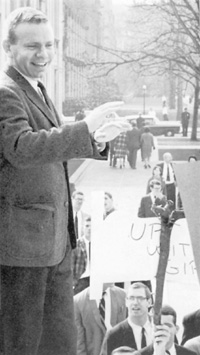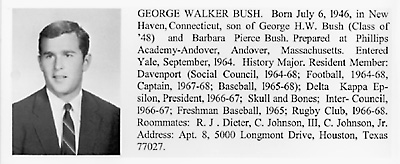
September 1, 2000
Volume 29, Number 1
White House to wear Old Blue once more

Pictured left is a photo of Connecticut senator and Democratic vice presidential nominee Joseph Lieberman from the 1964 Yale yearbook; the caption reads "Joe, our rabble rouser." Below is the 1968 Yale yearbook entry for Texas governor and Republican presidential candidate George W. Bush, listing his various activities on campus.
Vice President Al Gore's recent selection of U.S. Senator Joseph Lieberman as his running mate guarantees that, once again, a Yale alumnus will serve as President or Vice President of the United States.
Yalies have served in one of the nation's two highest elected offices ever since 1981. George H.W. Bush, Yale College '48, served as Vice President from 1981 to 1989 and then as President for four years, followed by Bill Clinton, Yale Law School '73, who has served as President since 1993.
In addition, three of the last five Presidents have been Yale alumni; Gerald Ford, who served as President from August 1974 to January 1977, graduated from Yale Law School in 1941.
Now, barring a political earthquake of some kind, either GOP presidential candidate George W. Bush, Yale College '68, will occupy the Oval Office starting next Jan. 20 or Lieberman, Yale College '64 and Yale Law School '67, will serve as Vice President under Gore.
In fact, three of the four candidates for President or Vice President have Yale ties; Richard B. Cheney, Bush's running mate, attended Yale College from September 1959 until January 1961 and from January to June 1962 before finishing his studies at the University of Wyoming.
What explains the presence of so many Yalies at the forefront of American politics? "It underscores the strong sense of civic duty of so many Yale graduates," President Richard C. Levin said. "Yale has always been committed to the education of leaders, and I'm confident that our graduates will continue to populate the highest levels of public service."
Steven R. Weisman, Yale College '68, an editorial writer with the New York Times, says that he sees the roots of the current national candidates' political careers in their time at Yale.
"... [W]hat I find striking about the candidates," he wrote in the Times, "is their echo of a peculiar strain of political ambition combined with do-goodism rampant at Yale in the 1960s, when I was a student along with Mr. Bush and Mr. Lieberman and other budding politicians like Senator John Kerry of Massachusetts and Governor George Pataki of New York."
As Weisman suggests, Yale's reach is not limited to the White House. Yale graduates continue to be numerous among governors, senators, and members of the U.S. House of Representatives. They populate other top posts in the executive and legislative branches of federal, state and local governments. They also serve as volunteers all over America.
Nor is Yale's reach limited to politics. The University has educated more leaders of major U.S. corporations than any other. From Cole Porter to Maya Lin, few institutions rival Yale's record in producing artistic, dramatic, and musical talent of distinction. Yale alumni served as the first presidents of Princeton, Columbia, Williams, Cornell, Johns Hopkins, the University of Chicago, and the Universities of Georgia, Mississippi, Missouri, Wisconsin, and California. The record in law, medicine, science, and religion is no less distinguished.
The presence of Yalies at the highest reaches of politics, business, law, journalism, the arts, science, medicine, academia, and other pursuits is no accident. It reflects a priority that Yale's founders set at the birth of the institution in 1701 and that generations of their successors have carried forward to this day.
Yale's charter of 1701 charges the Collegiate School with the task of educating youth to be "fitted for Publick employment both in Church and Civil State." While academic excellence remains the most important single criterion for admission, Yale has always looked for something more -- for those elusive qualities that give young men and women the potential to have an impact on the world, to make contributions to the larger society through their scholarly, artistic, and professional achievements, and to work for the betterment of the human condition.
Today, to nourish the development of leadership skills, Yale invests heavily in extracurricular activities, student organizations, and athletics. The University seeks students who can provide leadership to all segments of our heterogeneous society. We continue to provide, to all who qualify for admission as undergraduates, sufficient financial aid to guarantee that the cost of a Yale education does not prevent those with the greatest potential for excellence and leadership from attending.
Yale recognizes that the leaders of tomorrow will operate in a global environment. To help prepare them, the University has taken steps to internationalize its curriculum. The content of many social science, law, and business courses is far more international than even two decades ago, and enrollment in foreign language courses is at an all-time high. We have many international students in our graduate programs, and we are admitting increasing numbers to Yale College. We also have expanded the opportunities for our undergraduates to study abroad.
At the same time, Yale does not lose sight of the vast opportunities for leadership in its host city, New Haven. More than half of our 5,000 undergraduates participate in community service during the course of their Yale years, often with young people in the public schools.
For instance, nearly 100 undergraduates tutor one-on-one with every third grader at a local school. Faculty and students from our School of Music teach high school students, while those from our Schools of Medicine and Nursing offer a summer science program for high schoolers. Undergraduates have taught chess at the New Haven Free Public Library, counseled young teenage women, and produced plays performed by children from around the city.
Not surprisingly, Yale students do not forget their civic responsibilities once they graduate. The Mellon Foundation recently found that nearly two-thirds of those who had graduated Yale College two years earlier participated voluntarily in local civic activities and organizations, and that 20 percent had leadership roles in such activities. Of those 15 years beyond graduation, more than two-thirds had served as volunteers since graduation and nearly 30 percent had served as leaders. Of those 40 years beyond graduation, 83 percent had participated as volunteers and 56 percent had taken leadership positions. If added to the involvement with national charitable organizations and with environmental and conservation groups, the percentages of those who had participated in at least one volunteer activity rise even further.
As the historian George Pierson put it, Yale has long been a place where activities outside the classroom have played almost as large a role in the education of our students as the curriculum in it. It is at least part of the reason why so many of America's leaders have come from the campus.
